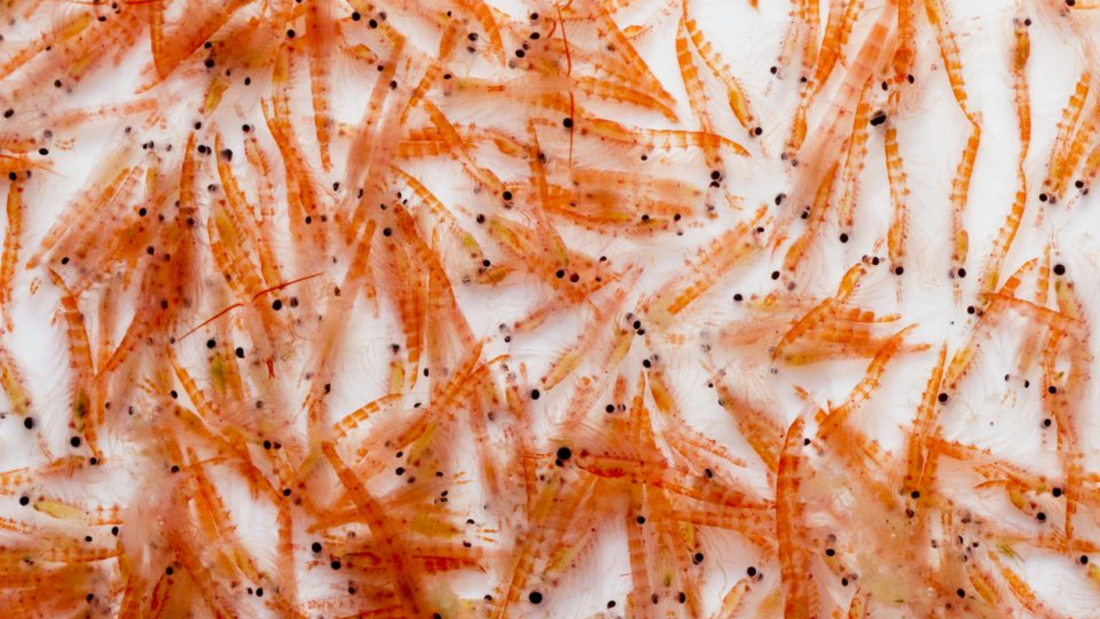
Krill Oil and Omega 3: Sustainably Sourced
Share
How much do you know about the krill industry? Like many aspects of our diets, many people don’t fully understand where this product comes from. Fortunately, this is one of the few good news stories from the fishing industry. Krill is not only an important source of omega-3 (something that two-thirds of us need more of), but it’s also a sustainably sourced product. Here’s how krill oil can be the perfect environmentally-friendly alternative to traditional fish oil.
What is Krill? The Value of Omega-3
One of the healthiest ways to eat is by adopting the pescatarian diet, which consists of plenty of fatty fish. But for those of you who wince at the thought of large plates of seafood, fish oil supplements can be an easy and convenient alternative.
Among the squid and the cod is a little-known crustacean called krill. Similar to a prawn, species of krill occur in most oceans, but it’s only around the Antarctic that one species, known as Antarctic krill, plays such a dominant role in the marine ecosystem.
Antarctic krill sits in the middle of the ecosystem between the microscopic plants and animals, which form the base of the food chain, and the larger animals such as seals, penguins and whales that depend on them for food. They swim in vast, dense swarms that can stretch for miles. Hugely abundant, they’re easy to catch. In fact, it is estimated that there are between 120 and 600 million tonnes of krill, making them the most abundant species on the planet.
Krill is packed full of health-promoting long-chain omega-3 acids as well as phospholipids, choline and astaxanthin. Omega-3 fatty acids are particularly important as they help to support the health of the heart, joints, brain, liver, skin and eyes, and their health benefits are documented in over 30,000 publications.
Stronger Regulations
One of the criticisms of the seafood industry, in general, and krill, in particular, is that it’s not sustainable. While that’s true for much of the fishing industry, it doesn’t seem to be so for krill. According to a report by Stephen Nicol PhD, krill is actually one of the most sustainably-managed industries in the world. This is partly because the fishery is regulated through a series of measures that specify how much can be caught and where it can be caught in any one year. These annual Precautionary Catch Limits (PCL) are far more conservative than normal fishery quotas too. In fact, statistics from 2014 rank krill as the 40th largest fishery. Far more anchovy is caught, despite this species occupying a much smaller area than krill.
Eco-Harvesting Technology
To further increase the sustainability of the krill fishing industry, new harvesting technology has been created, which does the job as effectively as possible while minimising the ecological impact.
The new machinery connects a trawl to a vessel. As it travels through the Antarctic sea, it’s able to recognise which catches aren’t krill and releases them back into their environment unharmed. This reduces something known as by-catch, which causes unnecessary harm to organisms living in proximity to krill.
This system efficiently catches the krill, keeping it fresh. This is the best way to achieve both sustainability and commercial success. That’s a balance that much of the rest of the fishing industry - not to mention the meat industry more widely - has often failed to strike.
The Antarctic is one of the most important but vulnerable places on this planet. Krill is just one species down there that needs to be carefully and sustainably harvested. It offers such incredible health benefits to humans, but we need to protect the population and ensure that it’s able to thrive and benefit the ecosystem that surrounds it.
Certified Sustainability
At Neubria, we care about sustainability. We work with natural products that cause minimal damage to the environment while bringing maximum benefits to consumers. The krill industry has achieved certified sustainability, being recognised by a number of organisations. These include the Marine Stewardship Council and the World Wild Life Fund for Nature. Krill harvesting companies are working closely with these organisations as a way to ensure the sustainable management of the krill population.
If you’re interested in using krill to boost your own physical and mental wellbeing, then consider trying Neubria Krill Oil. This doesn’t just contain an advanced form of omega-3, but also choline, an essential nutrient for many bodily functions such as nerve signalling, as well as liver and muscle function. Only a small amount of choline can be made in our bodies, so it must be obtained through our diet.
